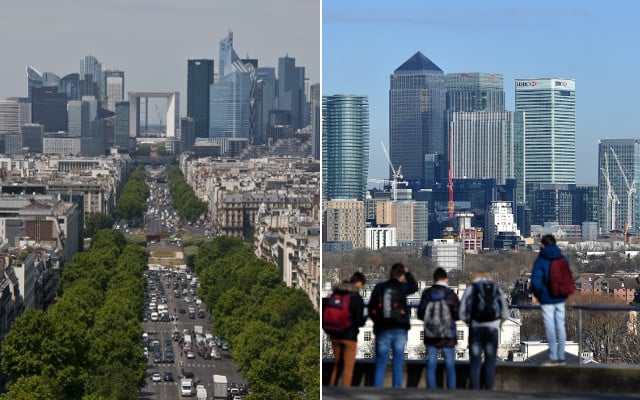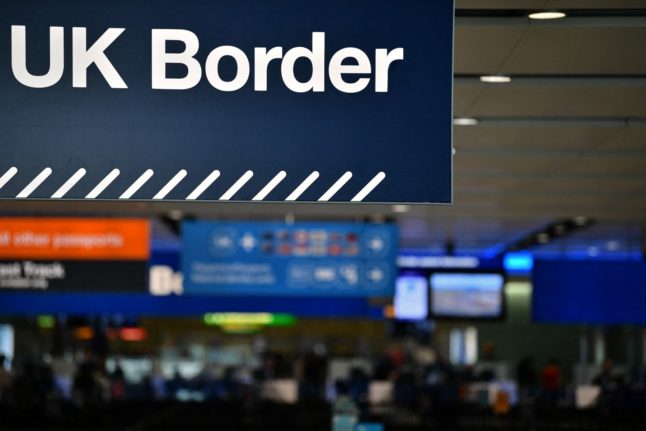France continues to make eyes at London's bankers and on Friday the Prime Minister Edouard Philippe laid out a raft of measures to attract financiers who may have to leave London when the UK leaves the EU.
Among them are scrapping a plan to widen a current 0.3 percent tax on financial transactions, eliminating the top income tax bracket for top earning bankers (those picking up over €150,000 a year), and keeping bonuses out of the calculation of severance pay for “risk-takers” such as stockbrokers in order to make redundancies less expensive.
Those measures might have been unthinkable in France under the previous government of former President François Hollande, who famously declared the world of finance was his “enemy”, but given the fight for the scraps from the Brexit fallout, France under former banker Emmanuel Macron seems prepared to do whatever it takes to fight off the competition.
“You can regret this (Brexit) decision or welcome it, but it's a fact,” said Philippe, speaking on the roof of the Monnaie de Paris — the national mint — with the city's glass-and-steel La Defense financial district visible in the distance. “You have to deal with it.”
“Welcome back to Europe”
Paris regional president Valerie Pecresse said in English: “To investors, and to those disappointed by Brexit, I want to say that we are ready to roll out the blue, white and red carpet for you. Welcome back to Europe.”
In another step aimed at attracting foreign businesses, the Paris area is to open three more international high schools by 2022 (Lycée Internationales).
The Lycee Lucie-Aubrac de Courbevoie near the La Defense business district to the west of Paris will become a Lycee International next year, meaning classes are taught in several languages on top of the French curriculum.
By 2021 another Lycee International will open in Saclay to the south of Paris, which is aiming to become a “global innovation cluster” and finally another one will open at Vincennes to the south east of Paris.
READ ALSO:
- Brexit blues? Here are 10 reasons to move from London to Paris
- Brexit helps push Paris property prices towards record levels

Prime Minister Philippe also announced that work had begun to establish an international tribunal in Paris to handle financial cases in English.
Most international financial contracts are written in English and make reference to British law.
It will be possible “to plead in English and British law will be applied,” according to senator Albéric de Montgolfier, who wrote a report on how Paris could benefit from Brexit.
Also in the pipeline is the “CDG Express”, a rail line linking Charles de Gaulle airport to the city.
French President Emmanuel Macron has pledged to relax France's rigid labour laws to free its economy from red tape and excessive taxation.
In another carrot for businesses tempted by a move to Paris Macron has also pledged to cut corporation in tax from the current level of 33 percent to 25 percent by 2022.
The French financial sector currently represents about 4.5 percent of national output and employs around 800,000 people.
Paris is competing with Dublin, Frankfurt and other centres for an expected shift in finance jobs out of London as a result of Brexit.
Several banks, especially Asian institutions, have recently announced that they would move European headquarters from London to Frankfurt in response to Brexit.
Bloomberg News said Thursday it would move investment banking activities from London to its Frankfurt headquarters.
With Britain at risk of losing the “passporting rights” financial firms use to deal with clients in the rest of the European Union when it leaves, employees in direct contact with customers may need to be based on EU territory in future.
Other jobs will need to move to deal with business that must be booked in the European Union, as will risk management workers, who must be based in the EU to satisfy banking supervisors' requirements.
So far Brexit has had a limited impact in Paris, apart from banking giant HSBC's decision to relocate 1,000 employees from London to the French capital. JP Morgan Chase, for its part, is moving to Dublin, Frankfurt and Luxembourg.
“At this stage there are no commitments besides HSBC's,” said junior finance minister Benjamin Griveaux. “We're working on it. Today is an important signal to investors.”
The French government and Paris city chiefs have already carried out several charm offensives aimed at wooing talent and companies from London.
In November last year the government announced itwas opening a one stop shop to provide firms everything they and their staff need to relocate across the Channel.
It will be located at 11 Rue Cambrai in the 19th arrondissement of the city and will essentially help businesses and staff overcome the administrative hurdles of resettling in France.
And in February this year the government sent a raiding party across the Channel to woo bank and finance chiefs.
In September it announced it was cutting red tape for British based businesses and even President Emmanuel Macron got in the act when during a campaign trip to London in February he brazenly urged French expats and British talent to move across the Channel.
His message was “France is changing”.
But it still has a way to go before it might be seen as the best option for banks and finance centres.
A recent study by the World Bank ranked France below the likes of Georgia, Macedonia and Latvia for ease of doing business.



 Please whitelist us to continue reading.
Please whitelist us to continue reading.
Member comments